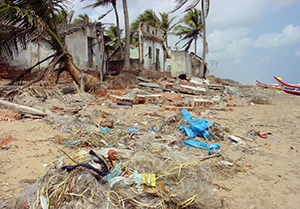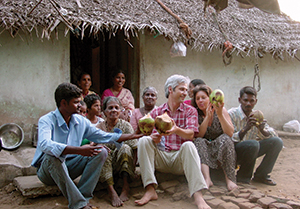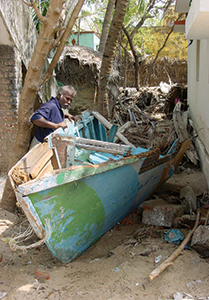The Tsunami Effect
 Two tectonic plates collide miles beneath the earth’s surface, unleashing a chain of events that devastate surrounding landmasses. Hundreds of thousands of lives are lost, billions of dollars of property are destroyed, and entire nations are left in ruins after suffering the worst that Mother Nature has to offer.
Two tectonic plates collide miles beneath the earth’s surface, unleashing a chain of events that devastate surrounding landmasses. Hundreds of thousands of lives are lost, billions of dollars of property are destroyed, and entire nations are left in ruins after suffering the worst that Mother Nature has to offer.
While this may read like the plot of Hollywood’s latest disaster film, this was a brutal reality for hundreds of millions of people during the horrifying events of the 2004 Indian Ocean tsunami. Thousands of nonprofits, nongovernmental organizations and government-sponsored enterprises provided medical, financial and human services support. Timothy Trujillo’s Tsunami Effect is the story of a man and his work in India following the devastating tsunami of December 2004.
Trujillo’s career as a performance artist abruptly ended in 1993 after several years of struggle with chronic pain. Directed by his doctors to “find something else to do with his life,” he had to cancel auditions with Cirque du Soleil and walk away from a career he knew and loved. “I had no idea it was the obstacle that would lead to a course correction setting me on my path of destiny,” Trujillo recalls.
Trujillo was forced to reassess what he wanted to do with his life and found his calling in alleviating the pain of others. Founded in 1996, his organization First Medicines works to reduce suffering and enhance health worldwide by using traditional and integrative therapies. First Medicines focuses its services on people with cancer, HIV/AIDS, Multiple Sclerosis and other debilitating illnesses. Trujillo’s innovative approach is non-pharmacological and non-invasive—allowing people to take control over their physical and spiritual well-being.
 Trujillo wrote Tsunami Effect to reflect on his organization’s work and to outline his own beliefs on the power of human connections to alleviate physical and mental pain. The book draws on Trujillo’s first-hand experience in helping others cope with discomfort, and it provides an intimate portrait of what it was like to work in the ravaged landmasses surrounding the Indian Ocean after the 2004 tsunami.
Trujillo wrote Tsunami Effect to reflect on his organization’s work and to outline his own beliefs on the power of human connections to alleviate physical and mental pain. The book draws on Trujillo’s first-hand experience in helping others cope with discomfort, and it provides an intimate portrait of what it was like to work in the ravaged landmasses surrounding the Indian Ocean after the 2004 tsunami.
The tsunami’s destruction was captured in media reports and photographs, but Trujillo feels that they insufficiently conveyed the scale of the devastation. “Those images could not convey the thickness of the air and the odors of fetid, seawater-soaked household goods,” he remarks. Being there in person gave him a true sense of how powerful those destructive waves were. “The media reports could only portray a passing moment of the victim’s despair. Their suffering was constant and pervasive, affecting every aspect of life,” Trujillo writes.
Trujllo’s work throughout the Indian countryside took an emotional and physical toll. “I make it a rule when dealing with any crisis to take care of myself first,” Trujillo explains, because he is unable to help anyone else if he himself is in subpar physical or mental shape.
Trujillo finds a deep sense of fulfillment in his work with the victims of the 2004 tsunami and in the various projects undertaken by First Medicines. “I have been fortunate to see what individuals are capable of in coping with pain and trauma,” he explains. “I see people moving beyond their suffering and find their true power. We will only know what we are capable of when the time comes to take on a challenge,” he adds. “Since childhood I have wanted to help people feel better. The work of First Medicines has allowed me to achieve this beyond measure.”
 A recurrent theme in Tsunami Effect is the marginalization of groups of society. Trujillo calls marginalization “one of the greatest problems in the developing world” because “these marginalized populations have the highest risk of impact from natural disasters, yet have limitations on resources for recovery.” Tsunami Effect creates a powerful contrast between first- and third-world definitions of poverty. Trujillo thinks our relative affluence has desensitized many to the plight of the poor, especially in the developing world. “Running hot water, light switches, stovetops with pilot lights, beds and walls are all part of our essential needs. These are grand luxuries in many of the places I have worked”.
A recurrent theme in Tsunami Effect is the marginalization of groups of society. Trujillo calls marginalization “one of the greatest problems in the developing world” because “these marginalized populations have the highest risk of impact from natural disasters, yet have limitations on resources for recovery.” Tsunami Effect creates a powerful contrast between first- and third-world definitions of poverty. Trujillo thinks our relative affluence has desensitized many to the plight of the poor, especially in the developing world. “Running hot water, light switches, stovetops with pilot lights, beds and walls are all part of our essential needs. These are grand luxuries in many of the places I have worked”.
He offers cautionary advice for those wanting to serve in disaster relief efforts. “Expect difficulty, prepare for the worst and have a plan to take care of yourself physically and emotionally.” Trujillo is particularly insightful when discussing how to measure success. “Expect exhilaration over small feats, for every effort is a grand accomplishment. Expect to need deep rest and the company of friends and laughter at the end of the day.”
If readers could take just one lesson from Tsunami Effect, Trujillo hopes it is that anyone can heal. “There is a power beyond them that can enhance their own abilities. Just as the resistance and strength of the Tamil villagers aided me while facing my own tsunami effect, it is my greatest aspiration that one who is in need will find help in the pages of this book.”
Learn more about Timothy Trujillo and where to purchase Tsunami Effect at timothytrujillo.com.




